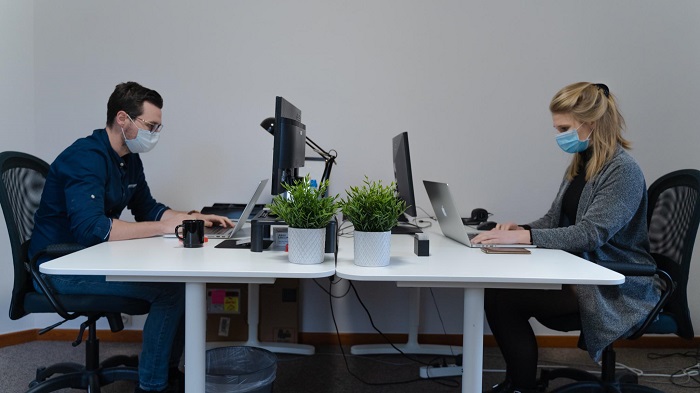

|
|

Image Source: Unsplash
November 3 2021 - With vaccines widely available and the resumption of normal activities well underway, itís easy to assume the COVID-19 pandemic is over. Unfortunately, thatís a far cry from the truth, as hospitals continue to experience surges due to the Delta variant and decreased social distancing precautions.
As an HR worker, hearing anti-vaccine sentiment in the workplace can be discouraging. With the safety of your staff in mind, itís only natural to want to nip these ideas in the bud. But what can you do when vaccine misinformation is running rampant and seemingly out of control? Letís take a closer look at how HR workers can respond professionally to vaccine hesitation at work.
Educate Your Employees
Anti-vaxxers seem to use every argument under the sun to justify their stance, but these arguments are often misinformed and ill-founded in the eyes of the scientific community. Vaccine hesitancy is justified by isolated breakthrough cases, alleged long-term vaccine risks, and more; however, the evidence on which these conclusions are based simply doesnít hold up to scrutiny.
The truth is that unvaccinated people are 11 times more likely to die of COVID-19 than their vaccinated counterparts. In the history of vaccine trials and rollouts, the longest documented side effects have never appeared more than two months after administration. Additionally, since the beginning of 2021, most hospital admissions were people who were not fully vaccinated. In comparison, the risk of vaccine complications is highly rare and usually curable.
As an HR staff member, you likely donít possess the scientific authority to combat vaccine misinformation. Fortunately, there are experts out there. Epidemiologists possess an in-depth knowledge of vaccine data and COVID-19 trends and may even work in public policy development or public health surveillance. Hiring a local epidemiologist or medical professional to discuss the facts about the virus and vaccine can help stop the spread of vaccine hesitancy in the workplace.
If thatís not an option, there are other ways to educate your employees. For example, you can provide them with well-researched, reliable resources on how vaccines work, how theyíre made, and how safe they are. Once they see that the COVID vaccine and the flu vaccine arenít so different after all, they may be more likely to give vaccines a shot.
Institute Safety Policies
Unfortunately, you wonít be able to combat all misinformation at its source. Most employers canít impose a vaccine mandate upon their employees, but other solutions can help keep your workplace safe as you return to work after COVID-19.
Even if your local city or county doesnít require mask mandates, itís still a good idea to put in place vaccination and masking policies in the return to work. The U.S. Centers for Disease Control and Prevention (CDC) recommends indoor mask use for unvaccinated individuals. Many workplaces have begun instituting a reasonable accommodation policy for the unvaccinated, which includes constant mask-wearing and frequent testing.
Increased flexibility in teleworking policies can also help reduce the caseload nationwide, along with desk distancing measures. If cases in your area escalate alarmingly, you may want to consider a remote or hybrid working model.
In addition, frequent surface sanitization and social distancing practices should still be kept in place for maximum safety. If any of your employees do contract COVID-19 or come into close contact with an affected individual, they should be sent home until they test negative to avoid spreading the virus in the workplace - even if theyíre asymptomatic.
Set an Example
When it comes down to it, as an HR member, youíll never be able to force people into getting the vaccine, even if itís for their own health and safety. The best you can do is provide a safe work environment with plenty of COVID-19 precautions and educational opportunities. You can also lead by example, showing your employees the benefits of vaccination.
Your employees are more likely to follow in your footsteps when they see the safety benefits of the vaccine firsthand. If youíre already fully vaccinated, you can help ease fears about vaccine side effects. You can also detail your reasons for getting vaccinated, whether itís to protect an immunocompromised family member or simply to help reduce the burden on hospital intensive care units.
Winning the Battle Against COVID-19 in the Workplace
Although many Americans are choosing to turn a blind eye to COVID-19 now that social distancing and mask mandates have been mostly eliminated, the fight is far from over. U.S. vaccination rates have slowed to a crawl while hospitals have been overwhelmed by the latest wave of Delta variant cases.
A COVID-19 resurgence seems to be flaring up amongst the unvaccinated, and the last thing you want is for the virus to make its way into your workplace. By properly educating your employees, instituting pandemic safety protocols, and leading by example, HR employees can help combat both anti-vaccine sentiment and the virus itself.

Jori Hamilton is a freelance writer residing in the Northwestern U.S. She covers a wide range of subjects but takes a particular interest in covering topics related to business productivity, recruitment, HR, and marketing strategies. To learn more about Jori, you can follow her on Twitter and LinkedIn.
HRM Guide makes minimal use of cookies, including some placed to facilitate features such as Google Search. By continuing to use the site you are agreeing to the use of cookies. Learn more here
|
| Privacy Policy |
|
|